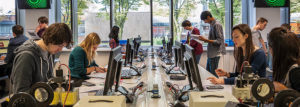How you'll learn
Our research-led teaching ensures you are taught the latest advances in cutting-edge physics research. Lectures introduce and provide the details of the various areas of physics and related subjects. You will be working in tutorials and problem-solving workshops, which are another crucial element in the learning process, where you put your knowledge into practice. They help you to develop a working knowledge and understanding of physics. All of the lecturers also perform world class research and use this to enhance their teaching.
Most work takes place in small groups with a tutor or in a larger class where staff provide help as needed. Practical work is an integral part of the programmes, and ranges from training in basic laboratory skills in the first two years to a research project in the third or fourth year. You will undertake an extended project on a research topic with a member of staff who will mentor you. By the end of the degree you will be well prepared to tackle problems in any area and present yourself and your work both in writing and in person. In the first two years students take maths modules which provide the support all students need to understand the physics topics.
How you're assessed
Physics modules – The main modes of assessment are coursework and examination. Depending on the modules taken you may encounter project work, presentations (individual or group), and specific tests or tasks focused on solidifying learning outcomes.
Geophysics modules – Assessment matches the learning objectives for each module and may take the form of written exams, practical laboratory and computer examinations, coursework submissions in the form of essays, scientific papers, briefing notes or lab/field notebooks, reports and portfolios, oral and poster presentations and contributions to group projects, and problem-solving exercises.
Liverpool Hallmarks
We have a distinctive approach to education, the Liverpool Curriculum Framework, which focuses on research-connected teaching, active learning, and authentic assessment to ensure our students graduate as digitally fluent and confident global citizens.
The Liverpool Curriculum framework sets out our distinctive approach to education. Our teaching staff support our students to develop academic knowledge, skills, and understanding alongside our graduate attributes:
- Digital fluency
- Confidence
- Global citizenship
Our curriculum is characterised by the three Liverpool Hallmarks:
- Research-connected teaching
- Active learning
- Authentic assessment
All this is underpinned by our core value of inclusivity and commitment to providing a curriculum that is accessible to all students.










